Getting Paid
I’ve been busy! I just finished playing bass in a local play and I’ve started a new project with my pal Beth Ann Erickson (she’s a writer-extraordinaire). Together we talk about topics relevant to creative folks; musicians, writers and yes bass players too (I realize I did say musician but you get the point).
Check out this podcast from ‘Notes from Minnesota,’ where Beth and I talk about bringing in the dough and how to decide when it’s okay not get paid, if ever. For more podcasts, check out my new site: www.lindseytreemusic.com
Here it is:
Improve Your Bass Playing with these Five Quick Tips
Use these career boosting tips to improve your bass playing. Each time I have used one of these tips, my career and abilities have taken a jump and the same will happen for you. So whether you play for the pure love of this fantastic instrument or you are a pro, check out these tips:
- Learn new material: I remember when I was younger and my friends and I would jam, it was more fun to play the songs or licks to songs that we already knew than to try and learn new songs. But, it’s important to learn the whole song so when you do get an opportunity to play with other people you’re not just pulling out all the cool licks from songs and only being able to play about 8 bars of 20 different songs. It would be more productive to play 10 songs well and all the way through. I have observed this with too many guitar players playing every hot new lick on the radio but not being able to play even the most basic chord structure in a song and it’s just darned annoying.
- Learn and Practice scales: When learning new material, don’t limit yourself to new songs. I am a huge supporter of learning scales. By doing this you are not only building dexterity in your fingers and creating muscle memory for each different key signature, you are also building a foundation on which you can pull from to create original bass lines and create awesome solos.
- Practice with a metronome: Everybody seems to hate doing this because it is somewhat tedious, especially at first. Start simple; pick a bass line or a scale or even a song you know. Then, set the metronome to a slower speed than your ultimate goal. When you can play the passage or song you picked perfectly at that slower speed, gradually increase the speed until you hit your targeted goal. As tedious as this seems, it is important to improving any level of bass playing as it helps you to internalize a steady tempo. In a band, it is the bass player’s job to liaison between the melodic (lead guitarist) and the rhythm (drummer). We do this by playing a supporting melodic bass line as well as holding the tempo steady with the drummer. Practicing with a metronome will also bring you closer to playing in the pocket (which is another blog post coming soon).
- Learn a new skill: This can be anything that will expand your knowledge/skill base. For example, if you always use a pick (and I hope you don’t) then try playing without one. Remember to alternate your index and middle fingers. If you never use a pick, try playing with one. If you primarily read music or use tabs, try relying only on your ear. Usually, people learn using a combination of reading music or tabs and playing by ear. If you are better at one than the other, then practice the weaker skill. The stronger skill will improve as well.
- Play more: Take your new found skills from practicing and try them out by playing music with other people. There are numerous venues for every skill level to be able to learn from and interact with fellow musicians. Some clubs or bars have Jam sessions-a great way to meet other musicians. You could try Community Theater, often times they are looking for musicians to play in the ‘pit’ for musicals. Put an article in Craig’s List and get together with other like-minded musicians. Be honest in your ad about what you are looking for and what your skill level is. Praise bands at church are becoming very popular. I can think of six or seven in the small community that I live in that have praise bands and often times they will alternate musicians. Playing or performing music with other musicians as opposed to playing with recorded music improves your chops because you are relying on your own brain power instead relying on something that will always be 100% the same every time you play the recorded music. When I learn cover tunes, I learn them pretty much like everybody else does; I listen to the song and copy what the original artist has laid down on the tracks. I am relying on and can hear the bass lines that are already there. When I perform the same cover tune live, the safety net is gone and I am relying on my own brain power to know where the song goes and to listen to what the other people in the band are playing. If the lead singer starts singing the verse instead of a chorus, I must be able to hear it quickly and follow. When the guitarist takes a lead, I must know the chord progression to the bottom does not fall out. These are all skills that playing a recorded song over and over again can’t teach you. The experience of playing live can be the best teacher.
Gig often, enjoy life and rock the bass guitar!
As Promised! Bass Guitar and the Genre of Theater…..
My mind wanders easily after about the seventh or eighth show of a theater production. I’ve played in the pit for so many shows that I have literally lost count. One of the topics that runs through my mind is what to write for my blog? What would be helpful to other bass players? Well, of course! Sight reading and reading music in general, because at this point I notice the directors hands in the air and that is what I will be doing. Time to turn the volume up on my bass and focus on those notes on the page.
Here are a few tips to help you sort out the notes on the page:
Five Tips to Improve Sight Reading
Whether you are at a beginning, moderate or advanced level of sight reading, these tips will help you improve your sight reading and note reading skills. To practice, get any books you can get your hands on. Many bass guitar books have the tabs also written. When I am teaching, I will often take the time to make copies and block these out for my students so they can’t ‘cheat.’ It is too easy to look at tablature and it will not help you improve actual reading skills. Books that are written for upright bass (usually classical music) or books written for trombone are good choices as neither of these options use tabs.
- Know the key signature: The first thing I always do is look at the key signature and time signature. It can be overwhelming to see five flats or four sharps in the key signature, but if you know what key you are actually in then you can set your mind for playing in that key.
- Learn your scales: You’ve seen the key signature-five flats and you know that is the key of Db major (for this article I will only be talking about major key signatures and scales). Play the Db scale or visualize the Db scale. Your mind will be set to play those notes that are in the Db scale and will more easily eliminate the other notes that aren’t in the scale ensuring that you will hit more correct notes.
- Read ahead: Your eyes should be at least 2 -3 measures ahead of where you are playing. This allows you to know what is coming. At first, practice by forcing your eyes to be one measure ahead of what you are playing, as you become more comfortable; start increasing the amount of measures you can read ahead. I don’t think I am ever more than 3 measures ahead of what I am actually playing so if you can consistently be 1 – 2 measures ahead, that is a great goal.
- Learn the high notes: It is common to be very familiar with the notes on the first position of the bass guitar neck. We tend to become less familiar with the higher notes on the neck. This is a two-fold process. First, practice scales starting on the seventh fret (which would be a B scale if you are on the E string), say each not in the scale as you are playing it, then move up a half step and do the same with the C scale, D scale and E scale if you are really ambitious. Use this same process using the A string and again starting on the seventh fret (which will be an E scale), continue with the F scale, G scale and A scale. Remember to say the names of the notes as you are playing. This is crucial to the process. Second, find sheet music that is written with mostly higher notes or find scales that are written in these higher octaves. Now, practice looking at the notes, playing the notes and saying the notes out loud as you play them. This will get your brain working to memorize these notes by sight and when you are sight reading and come across these higher notes, you won’t freak out (like I used to).
- Count: Sounds silly, I know, but I have been tripped up so many times by forgetting to count. I will be on auto-pilot, reading quarter notes then up pops a measure with sixteenth or even just eighth notes and I miss the rhythm all together. To remedy this scenario, look ahead (which you will already be doing because you are following tip #3), and when you see a rhythm change, start counting eighth notes (or sixteenth notes or whatever the case may be) in your head even when you are playing the quarter notes. This will make the transition smoother from one rhythm to the next because your brain will already be dividing the notes into the smaller increments.
Small Town – Big Event
Gibson event in our small town of Spicer, Minnesota was a hit. I know I promised more information on playing an instrument in musicals the theater genre, but this show was too good not to share.
The call center for American Musical Supply is located in Spicer, Minnesota. Many area musicians work there and as a result, companies like Gibson put on shows to talk about their gear and providing for the people working in the call center.
Being a local musician, I try to attend as many of these events as possible. Last night was super fun because my brother, drummer extraordinaire was filling in with one of the bands last night.
Here are some of the pictures of the show. Shasta Boulevard with Roger Schaumann on lead guitar, his cousin, Marlowe Schaumann on bass guitar and Jay Skrukrud on drums.
B. B. King
Feeling sad: feeling grateful. Seems like conflicting emotions. I am sad that B.B. King has passed but feeling grateful for his massive contributions to the music world and the inspiration he shared with so many young and aspiring musicians.
Check out this link: A great story about a great man:
http://www.usatoday.com/story/life/music/2015/05/15/bb-king-obit/25381783/
Top 5 Comments Every Chick Bass Player Hates Hearing
5. “Who (which band member) is your husband?”
4. “Thank You for letting your wife play this gig with our band.”
3.“Did the guitar player (who happens to be male) teach you the bass riffs?”
2.“You’re the best looking bass player I’ve ever seen.”
1. “You’re pretty good…. for a girl.”
It astounds me that I still hear these comments. I guess I learned to expect it in the ’80’s when I started playing (yes, I was very young when I started playing bass!). The good news is I don’t hear these comments as often and there truly are times when I feel things have equalized. The even better news is there are more and more female musicians gigging regularly and I think we have started to support each other more as well.
So here’s to all chick bass players and female musicians everywhere!
Gig often, enjoy life and rock the bass guitar!
Just For Fun Videos
I have heard a few of these things working with guitarists over the years………….
Of course, I have NEVER said any of these things (video below) even in my younger days………..
But I really don’t use a pick.
I’m Back
Thank God my hiatus is over! And I do not mean ‘hiatus’ in the sense of a break in work. I mean a break from doing what I love to make easy money.
And when I say ‘easy money,’ that’s not quite right either. It is very difficult to earn money when your heart is in a different place. I can’t try to earn money doing something I don’t love. I thought I could work for one more year at a public school interpreting to bring in money while I continue to work on music interests, but with 3 kids at home, a full time job, etc., etc., I just couldn’t hack it.
One month ago, while at my day job, I was called into the principal’s office (actually it was the Human Resource office, but it’s more fun to say principal’s office) and was told I would be put on un-requested leave of absence: inward smile, outward professionalism. My job is dependent on student needs and a student moved away: inward, jump for joy, outward, hold it together. I would be allowed to work for two more weeks until spring break: inward disappointment, outward, “I’ll be happy to get [the other interpreter] up to speed.
This is the first time I have been laid off from work and it is surprising how quickly I was able to take care of details like insurance and budgeting. When something is right it can seem effortless. And by ‘effortless,’ I do not mean head-in-the-clouds-do-nothing-all-day. I mean that the work I do will be meaningful and fulfilling and in turn I will enjoy a meaningful and fulfilling life.
From now on you will be seeing and hearing a lot more from me as I vow to:
Gig often, enjoy life and rock the bass guitar!

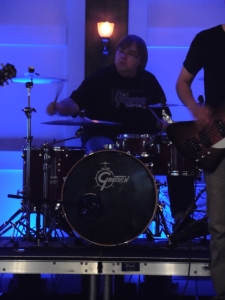

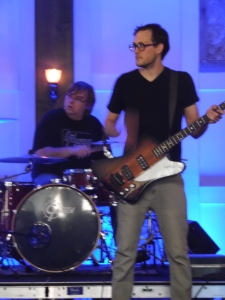
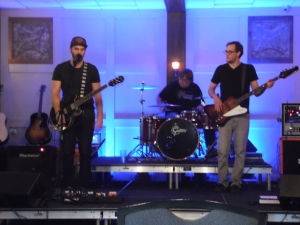

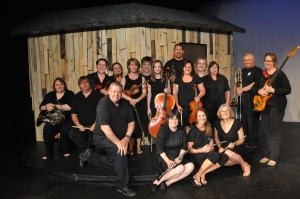

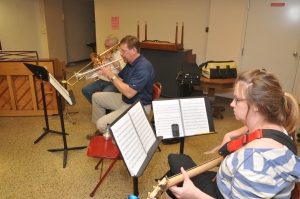
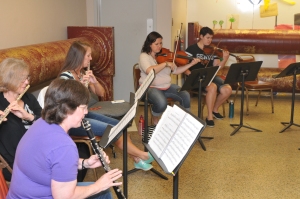
Recent Comments